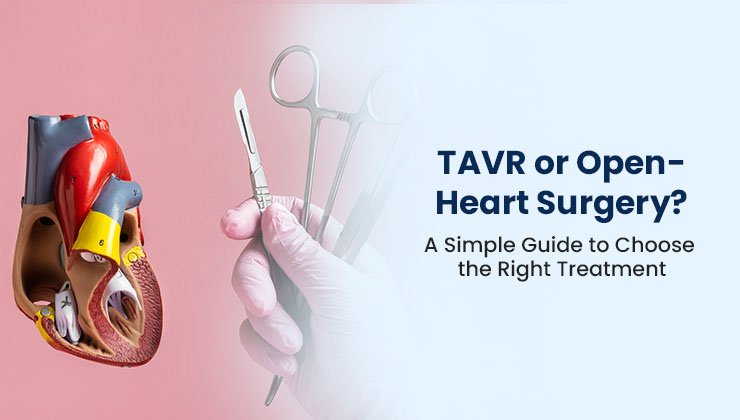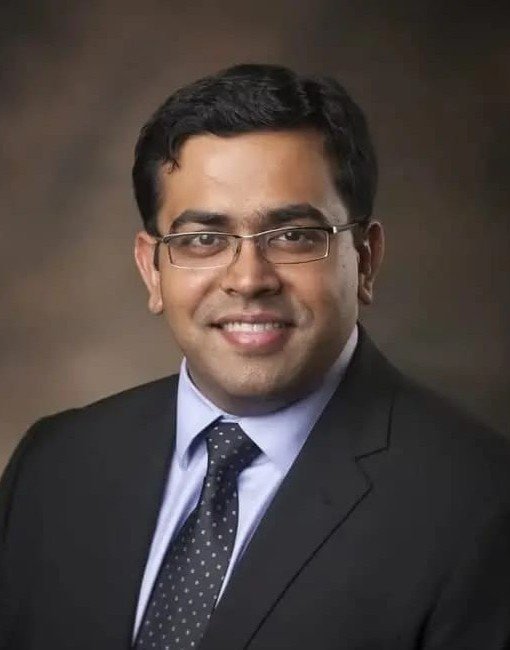The aortic valve of the heart controls the flow of oxygen-rich blood from the heart to the rest of the body. When it becomes narrowed or doesn’t open properly, it causes a condition known as aortic valve stenosis. To treat this condition, two main procedures are available: Transcatheter Aortic Valve Replacement (TAVR) and Open-heart aortic valve replacement surgery.
Understanding the differences, benefits, and risks between these two procedures may help patients make informed decisions about their heart care.
Keep reading to learn more about the comparison between TAVR and open-heart surgery!
Understanding TAVR
Transcatheter aortic valve replacement, also called TAVR, is a minimally invasive treatment that is used to replace a narrowed aortic valve that fails to open properly, a condition known as aortic valve stenosis.
It serves as an effective treatment option for individuals who are not suitable candidates for open-heart surgery to replace the aortic valve.
It helps to ease chest pain, shortness of breath, fatigue and other symptoms associated with aortic valve stenosis by improving valve function. It may also be known as TAVI, or transcatheter aortic valve implantation.
TAVR Procedure
During the procedure, the healthcare professional replaces a damaged aortic valve with a new one made from cow or pig heart tissue, mounted on a small metal frame.
- A local anaesthetic may be given to prevent pain in the treatment area and keep you comfortable.
- A thin, flexible tube called a catheter is inserted through a small incision, usually in the groin or chest, and guided to the heart.
- The new valve, which is mounted on a tiny frame, is guided through the catheter to the heart and then expanded.
- Once in place, the new valve expands and begins to work immediately, pushing the old valve aside. The surgeon then removes the catheter once the new valve is secured.
Good Candidate for TAVR
You may be a good candidate for TAVR if you
- Have severe aortic valve stenosis
- Are older in age or have other medical conditions that increase surgical risks
- Have previously undergone heart surgery and are not ideal candidates for another open-heart procedure
- Experience chest pain, fatigue, dizziness, or shortness of breath caused by aortic stenosis.
It is recommended to consult your healthcare professional to evaluate your overall health, heart anatomy and surgical risks to be considered for TAVR.
TAVR Recovery
Recovery after TAVR is generally faster and quicker compared to open-heart surgery. The exact length of hospital stay after the TAVR procedure will vary depending on your overall health and how well your body heals after the procedure.
During recovery, you may experience mild discomfort, bruising, or swelling at the catheter insertion site, which typically improves within a few days.
Most patients may return to normal daily activities within 1 to 2 weeks. However, it is important to avoid heavy lifting or strenuous exercise until cleared by the doctor. Attend follow-up appointments to monitor the valve’s function and heart health.
TAVR Benefits
The key benefits of TAVR include
- TAVR is minimally invasive, requiring a smaller incision
- Performed on people with high surgical risk
- Requires a shorter hospital stay
- Has a faster recovery time
- Minimal postoperative pain and faster healing
- Improved quality of life
TAVR Risks
TAVR is generally considered a safe and effective procedure, especially when performed by experienced professionals. However, as with any medical procedure, it may come with certain types of risks and complications, including
- Bleeding at the catheter insertion site
- Injuries to blood vessels
- Minor leakage around the valve
- Risk of infection at the access site or within the heart
- Stroke, kidney disease, heart attack, and in worst scenarios, death.
Understanding Open-Heart Surgery
An open, invasive aortic valve replacement heart surgery is a traditional surgery done to replace a poorly functioning aortic valve with an artificial valve.
While recovery from open-heart surgery may take longer than minimally invasive TAVR, it provides long-lasting results and remains suitable for younger individuals or those who need a durable valve solution.
Open-heart Surgery Procedure
Open-heart aortic valve surgery may take three to five hours.
- The surgeon gives general anaesthesia before the surgery to minimize pain.
- A 10-inch long incision is made down the middle of the chest to access the heart and separates the breastbone to access the heart.
- You will be connected to a heart-lung bypass machine.
- The surgeon removes the diseased or narrowed valve and replaces it with a new mechanical or biological valve.
- The surgery team will remove the heart-lung machine and sew the incision in the skin back together.
Good Candidate for Open-heart Surgery
Open-heart aortic valve replacement surgery is done if an individual
- Have changes in the aortic valve causing chest pain, shortness of breath, fainting, or heart failure
- Have a damaged or infected heart valve due to infection of the heart valve
- Received a new heart valve in the past, and it is not working well
- Have other problems, including blood clots, infection, or bleeding
Your healthcare surgeon will carefully evaluate your overall health and determine if open-heart surgery is suitable.
Open-heart Surgery Recovery
Recovery after open-heart aortic valve replacement surgery takes longer than minimally invasive procedures.
You may spend 24-48 hours in the ICU and may be required to stay in the hospital for 5 to 10 days or more, depending on your overall health.
You may experience mild pain, discomfort, fatigue, and weakness during the first few weeks. Avoid lifting heavy objects or strenuous activities until the doctor approves. Attend the regular follow-up appointments.
Open-heart Surgery Benefits
The key benefits of open-heart aortic valve replacement surgery, include
- Long-term durability
- Allows the surgeon to fully access and repair the diseased valve
- Provides relief from symptoms, including chest pain, fatigue, dizziness, and shortness of breath
- Proven long-term results
Open-heart Surgery Risks
The risks associated with open-heart aortic valve replacement surgery include
- Bleeding
- Small risk of infection at the incision site
- Irregular heart rhythms, in some cases requiring a pacemaker
- Blood clots leading to stroke or heart attack
- Heart rhythm problems
- Need for more surgery
- In severe cases, death
In many cases, open-heart valve replacement surgery remains successful in improving symptoms and extending life expectancy when performed by experienced cardiac surgeons.
TAVR Vs Open-Heart Surgery: A Comparison
TAVR is best for patients who are looking for a quicker and less invasive option with fewer complications. Open-heart surgery remains the preferred choice for younger or low-risk patients, providing durable, long-term results.
| Factor | TAVR | Open-heart Surgery |
| Type of procedure | Minimally invasive | Highly invasive |
| Anaesthesia | Usually local anaesthesia | General anaesthesia |
| Hospital stay | Shorter hospital stay, about 2-5 days | Longer hospital stay, about 5-10 days |
| Recovery time | Faster recovery (1-2 weeks) | Slower recovery (6-12 weeks) |
| Best suited for | Elderly or high-risk patients who may not tolerate open surgery well | Younger individuals and low-risk patients |
| Scarring | Minimal | Noticeable chest scar from open surgery |
Table: Comparison between TAVR and open-heart surgery
TAVR Vs Open-Heart Surgery: Which Is Better For You?
Deciding between TAVR and open-heart surgery will depend on several important factors, including
- Age and overall health of the patients: Younger patients often benefit more from open-heart surgery, as it provides a long-lasting solution.
- Severity of the aortic valve disease and associated conditions: The degree of valve narrowing or leakage will determine which procedure is safer.
- Surgical risks: Patients at higher or intermediate risks are recommended for TAVR, while open-heart surgery is recommended for severe heart conditions that can not be managed through TAVR.
- Durability needs: TAVR valves are durable, while open-heart surgery valves last longer.
It is important to consult your healthcare team to determine the best procedure suitable for your needs.
Conclusion
Both TAVR and open-heart aortic valve replacement surgery are effective treatments for aortic valve disease, each offering unique benefits based on the patient’s age, health condition, and surgical risk.
At Heart360 Care, our multidisciplinary team of cardiologists will work together and create a comprehensive patient-centered plan that ensures the safest procedure suitable for your heart needs.
If you are experiencing symptoms of aortic valve disease, book a consultation with Heart360 Care to receive personalised guidance!
Frequently Asked Questions
The life expectancy after TAVR depends on the patient’s age, overall health, and heart condition. Many patients live 5-10 years or longer after the procedure, especially if they have no major health problems.
Most people recover and live a full life after open-heart surgery due to advancements in medical science. Patients may return to normal activities with proper follow-up care, medications, and heart-healthy habits.
Heart failure after TAVR is not common. Most patients may experience better heart function and improved quality of life after the procedure. However, if the heart muscle is already weak or has underlying heart conditions, there may be a higher risk. Regular follow-ups may help detect the problems and manage complications early.
TAVR is often a better and safer option than open-heart surgery as it is minimally invasive, involves shorter hospital stays, and allows faster recovery. However, the treatment depends on each person’s overall health and heart condition.









